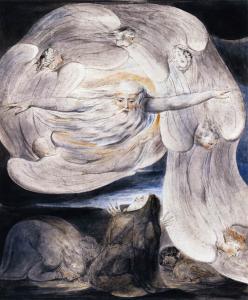
Recently, there have been many theological discussions and debates centering around the subject of universalism, the teaching that somehow, in the end (eschaton), everyone (and everything) in creation will end up “saved” (and not just in an objective manner). That is, there are many debating (and condemning) those who declare that it is necessary to conclude there will be no one who suffers eternal, or perpetual, perdition (however perdition is interpreted).
One of the problems involved with such debates is that there are many ways universalism can be and is approached. That is, there are many nuances to the argument, but those who contend against universalism tend to equate them as all one and the same and try to deny it is an overly-simplistic fashion. There are many different ways people come to accept universalism. Some, perhaps, can be refuted by the over-simplification which is used to deny universalism; that is, it is possible (but perhaps rare) to find those who actually teach that upon death, everyone will instantly attain beatification without any need of subjective transformation. In general, universalism is more nuanced, and tried to engage notions of hell, but they see hell as temporary, with its purpose as being to refine and transform the person, helping to eliminate all remnants of sin from them. And as such, those who try to suggest universalism necessarily has no way of engaging the question of evil, and with it, Scriptural discussions of hell, show they have not yet grasped all the possibilities contained within universalism.
Now, there are two kinds of objections often made concerning universalism which have more merit, though perhaps the first, that universalism is necessarily fatalistic, can be engaged by universalists who try to find a way to engage universalism while accepting free will. Nonetheless, it is also clear that many who discuss universalism undermine, perhaps unintentionally, human freedom, and so those who do should be objected to. The other objection which can and does have legitimacy is that universalism can be said to be too presumptuous, that those who teach it ignore the limitations contained with the human intellect, and with it, human reason. Universalism as speculation is different from universalism taught as a necessity, as something which logically follows what is known, without any potential for error. That is, some people want to put everything into a logical system, a system which they know and understand, and as such, a system which they think can be comprehensive and allow them to comprehend everything, even God. This is where presumption comes into play, because they assume to much of their knowledge and ability to extrapolate the absolute truth from the relative truths they have apprehended. Those who engage universalism in this manner fall into the same error as Eunomius by suggesting that humanity can comprehend the divine nature equally to the way God does so. Such presumption ends up being idolatrous, for all attempts to comprehend God through the human intellect create a notion of God which is less than what God really is. This is what apophatic theology reminds us; we must not end up turning God into something less than God is We must remember God is always transcendent to whatever we can or will say about God, and this is true, especially when we try to make some sort of systematic teaching about God which transcends what has been revealed.
These two concerns tend to be overcome by those who say they hope God can and will save everyone while remaining agnostic as to what will really happen. It is also able to be overcome by those who make speculative representations and explanations as why they think everyone will end up being saved if they admit that their reasoning can prove to be erroneous in some fashion or another. Those who admit the possibility of error do not fall under the condemnations given to universalism, because they are not being presumptuous and they allow the absolute truth to transcend their own comprehension, and yet, often, they (or even those who hope all will be saved, while thinking it is likely not all will) are falsely said to be universalists. Equivocation is used to make this suggestion, and in doing so, then make for quick condemnation, but because of such equivocation, the condemnation does not stick. For as long as someone admits that they can be wrong, and recognize that there are ways in which their speculation can prove to be false, they do not suffer the presumption which leads to what must be rejected by absolute universalism.
Of course, there are others who are more skeptical, those who think and hope it is possible all will be saved but find it is also possible, for one reason or another, that some, if not many, might do something to hinder their own salvation and so stay forever among the “lost.” They, like Hans Urs von Balthasar, find that one can have great hope for unexpected surprises which could lead to the salvation of all, but they also do not want to end up presuming or speaking of things they do not know. Many of them, like Hans Urs von Balthasar, will also explain why they are agnostic as to what the eschaton will be like through their examination of human freedom, something which they find is important to keep intact. They want it to be clear that such freedom cannot be so easily subverted by logical necessities – reality tends to prove itself far different from what such necessities would otherwise dictate. This can be seen in connection with “the fall” and sin in general. Neither make any logical sense, and if all one did was follow pure logic, they should never have happened. And yet they did. We must recognize that there is more going on than what we can understand with our logic. Indeed, sin corrupts and overturns such logical necessities through its inversion of logic and destruction of what is good, bringing chaos into the equation, a chaos which should leave us to pause and not end up presuming too much about what we can say about the nature and destiny of creation.
Those who are who hope for and desire the salvation of all limit themselves so as not to presume that such hope will necessarily be fulfilled. But even amongst them, they do not look at the question in the same way. Some can have a far more expectant hope than others. Everyone has different reasons for their hope, and so different reasons as to why that hope might not come to fruition. This, again, is why there are some who hold to the hope who look as if they fall under universalism, but do not, while others, who have such hope, might show more fear than that that some will be lost.
Universalism is not the only problem. Those who say that there must be and will be some who are lost end being too presumptuous as well. And, as Calvinism (for example) shows, they often end up being fatalists, making it that God predetermines and forces some to be among the lost. They declare their position is the only logical outcome of revelation and reason, and so, like many universalists, say their interpretation of facts cannot be wrong, and so end up denying the kind of hope which is important for the Christian faith. Because their presumption gets in the way of hope, they cause much pain and sorrow to others, to those who wonder or fear that some loved one might never have had a chance for salvation. Sadly, those who hold to this error rarely are confronted in the same way or intensity as universalists are, which is more than a little strange. Universalists focus on the good and its victory over evil, while those who hold that some, many, or most of humanity are lost, seem to give victory to evil and sin, and that should be enough to contend against such a position. Indeed, we find more of those who uphold this view become prideful, as they assume they are among the saved, and so are special, while those who are not saved are not special, and so are of no consequence. That undermines the love which they are meant to have for others, which should be enough to indicate their error. Thus, their pride is not only troublesome, but should be rejected.
Pride is a problem for all of us, and not just a problem we find when dealing with eschatological questions. When we pridefully think we have comprehended all that is needed to be comprehended, and we can’t be wrong, we find ourselves turning away from the absolute truth as we hold onto and become attached to the little portion of the truth we have apprehended. We become, that is, stuck at where we find ourselves to be, unable or unwilling to learn or apprehend more. Then, we find our faith becomes a thing of petty reason instead of the grasping for the great mystery which inspires and motivates us to do and be better, and perhaps, this, more than anything else, is why universalism, seen as the necessary conclusion that all will be saved, was rejected, but it should also then lead to a similar rejection for those systems which say, out of necessity, that it is impossible for all to be saved.
Stay in touch! Like A Little Bit of Nothing on Facebook.
If you liked what you read, please consider sharing it with your friends and family!
N.B.: While I read comments to moderate them, I rarely respond to them. If I don’t respond to your comment directly, don’t assume I am unthankful for it. I appreciate it. But I want readers to feel free to ask questions, and hopefully, dialogue with each other. I have shared what I wanted to say, though some responses will get a brief reply by me, or, if I find it interesting and something I can engage fully, as the foundation for another post. I have had many posts inspired or improved upon thanks to my readers.












